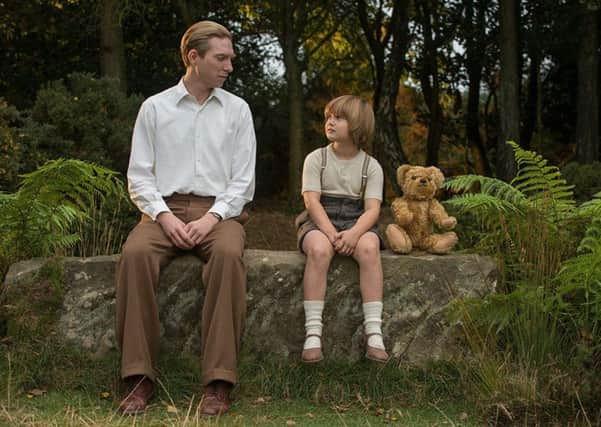Film reviews: Goodbye Christopher Robin | Home Again | Daphne | Brimstone


Goodbye Christopher Robin (PG) **
Home Again (12A) *
Daphne (15) ****
Brimstone (18) *
“Poor AA Milne,” opined Emma Thompson’s PL Travers upon being confronted with a load of Disney merchandising for Winnie-the-Pooh in Saving Mr Banks. This joke from 2013’s twinkly, behind-the-scenes comedy-drama about the creation of Mary Poppins was intended as a light-hearted poke at the ruthlessness with which Walt Disney had already commodified and marketed one wistful, beloved and very British literary creation just as he was getting ready to do the same with another. According to the new biopic Goodbye Christopher Robin, however, there was nothing “poor” about Milne in this sense: along with his wife Daphne, he was fully complicit in exploiting the commercial appeal of his creation long before Uncle Walt bought up the rights. And by “creation” the film doesn’t just mean the pot-bellied bear with the curious name; it means Milne’s eponymous son, whose life would be ruined by his fictionalised alter ego.
That’s the dark centre of this thoroughly middle-brow film, which attempts to explore how joy can be mined from misery, but fails to find a satisfyingly cinematic way to do so. Beginning with flashbacks to Milne’s service in the Battle of the Somme, the majority of the film takes place in the inter-war period in which the PTSD-afflicted playwright, novelist and editor of Punch (Milne is played with stiff-upper-lipped resolve by Domhnall Gleeson) struggles to reconcile his experiences on the battlefield with life in a country intent on pretending nothing had happened.
Advertisement
Hide AdDirector Simon Curtis (My Week With Marilyn) deploys cliché after cliché to depict Milne’s fragile mental state. Popped corks, burst balloons and bright lights all act as triggers and help explain Milne’s general indifference to his young son, Christopher Robin, but also his impatience with his wife (Margot Robbie), whose own lack of maternal instincts are explained away by her determination to pursue a frivolous life as a social butterfly in order to prevent any future suffering that might come from losing someone to whom she’s become emotionally attached.
That in itself is a fascinating character trait, but the miscast Robbie’s performance is too shallow to tease out that theme and the film struggles to show how all this anguish leads to the creation of Winnie-the-Pooh. That actually happens after Milne moves his family to the countryside. During a two-week period when he’s forced to look after Christopher (Will Tilston) by himself, his hostility to the boy thaws as they spend time wandering through the woods and making up stories starring Christopher’s soft-toy collection.
A few animated flourishes aside, the film doesn’t really dwell on the creative process, skipping instead to the downside of success, not least the adverse effect it has on the real Christopher. He grows up to loathe the Winnie-the-Pooh books and poems and his desire to escape the attendant celebrity has serious consequences that contravene his father’s oft-professed pacifist views. Alas, any impact this might have had is ruined by a shamelessly manipulative plot twist that seems at odds with the author’s artistic sensibility. Poor AA Milne indeed.
The apple doesn’t fall far from the tree in Home Again, the writing and directing debut of Haillie Myers-Shyer, daughter of rom-com auteur Nancy Meyers (The Holiday, Something’s Gotta Give). Like one of her mother’s films, this one starts with the main character crying hysterically in the mirror and pretty much goes downhill from there, with ludicrous plotting, banal observations on men and women and, oddly, a racist jibe directed at the one non-white character permitted a line. Reese Witherspoon takes the lead as Alice, the just-turned-40 daughter of a famous movie director who moves back into her late father’s palatial LA home with her kids and ends up letting a trio of aspiring 20-something filmmakers live in her pool house. Comedy hi-jinks fail to ensue as she falls for one of the guys and uses the others as free childcare and tech support for her interior design start-up. Michael Sheen plays her ex-husband and is thoroughly wasted in a film that, regardless of age and gender, should be insulting to pretty much anyone with a modicum of intelligence.
Award-winning Scottish director Peter Mackie Burns makes an auspicious feature debut with Daphne, a richly detailed character study of a 30-something Londoner (Emily Beecham) whose life is in a bit of an emotional nose-dive, something compounded by her witnessing a stabbing. What’s great about the film, though, is that this incident doesn’t catalyse an immediate change in Daphne – the aftereffects are subtle and lingering and the understanding she reaches about her life feels truthful and honest (not easy and movie-like). She’s also a pretty fascinating character to hang out with thanks both to Beecham imbuing her obnoxious behaviour with an emotional depth that tethers it to something human and relatable and Mackie Burns complimenting her performance with artful compositions that capture the vibrancy of modern-day London in a way that feels authentic.
Getting things all wrong is Brimstone, a pretentious and portentous western that takes a mimetic approach to showing how brutal frontier life was for women by victimising and subjugating its female characters for much of its two-and-a-half hour running time. Guy Pearce plays an evil preacher whose persecution of a mute midwife (Dakota Fanning) in the opening chapter is revealed to have many more layers of violence as the next three seemingly unrelated chapters unfold. Dutch director Martin Koolhoven goes heavy on the Old Testament imagery, but this is little more than an exploitation movie masquerading as serious cinema. ■